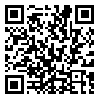Volume 20, Issue 80 (3-2022)
QJCR 2022, 20(80): 106-128 |
Back to browse issues page
Download citation:
BibTeX | RIS | EndNote | Medlars | ProCite | Reference Manager | RefWorks
Send citation to:



BibTeX | RIS | EndNote | Medlars | ProCite | Reference Manager | RefWorks
Send citation to:
Mousavi S F. Burnout and Well-Being in Couples Relationships: The Predictive Role of Moral Virtues in Dyadic Relationship. QJCR 2022; 20 (80) : 5
URL: http://irancounseling.ir/journal/article-1-1575-en.html
URL: http://irancounseling.ir/journal/article-1-1575-en.html
Department of Psychology, Women Research Center, Alzahra University, Tehran, Iran
Abstract: (7310 Views)
Aim: The current study was done with the aim of investigating the role of marital virtues in promoting well-being and coping with marital burnout of married men and women living in Tehran. The research method is descriptive and correlation. Methods: For this purpose, 290 married people (152 women and 138 men) were selected through convenient sampling. For data collection, the researcher-made Marital Virtues Scale, the Well-being Scale WHO-5 (2012), and Marital Burnout Scale (Pines, 1996) were administrated. Data were analyzed using correlation and stepwise regression tests. Results: The findings showed that there was a significant positive correlation between all marital virtues’ subscales and the well-being and there was a negative significant correlation between all marital virtues’ subscales and marital burnout. Also, the results showed the virtues of fairness, tolerance, love, and empathy can explain 13% of the variance of well-being (F=14.68, p <.001) and the virtues of fairness, foresight and precaution, love, and empathy can explain 33% of the variance of marital burnout (F=47.06, p <.001). Conclusion: The cultivation of moral virtues over time can predict well-being in couples and could be considered as a strategy to deal with marital burnout.
Article number: 5
Type of Study: Research |
Subject:
Family Counseling
Received: 2021/05/3 | Accepted: 2022/01/8 | Published: 2022/02/28
Received: 2021/05/3 | Accepted: 2022/01/8 | Published: 2022/02/28
Send email to the article author
| Rights and permissions | |
 |
This work is licensed under a Creative Commons Attribution-NonCommercial 4.0 International License. |






